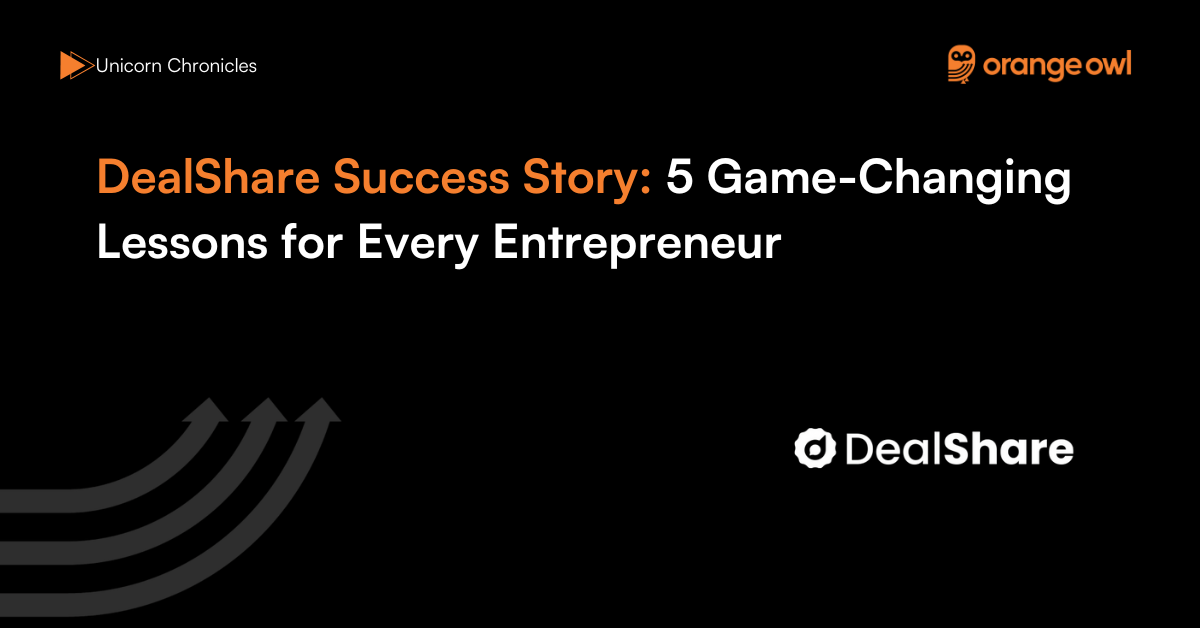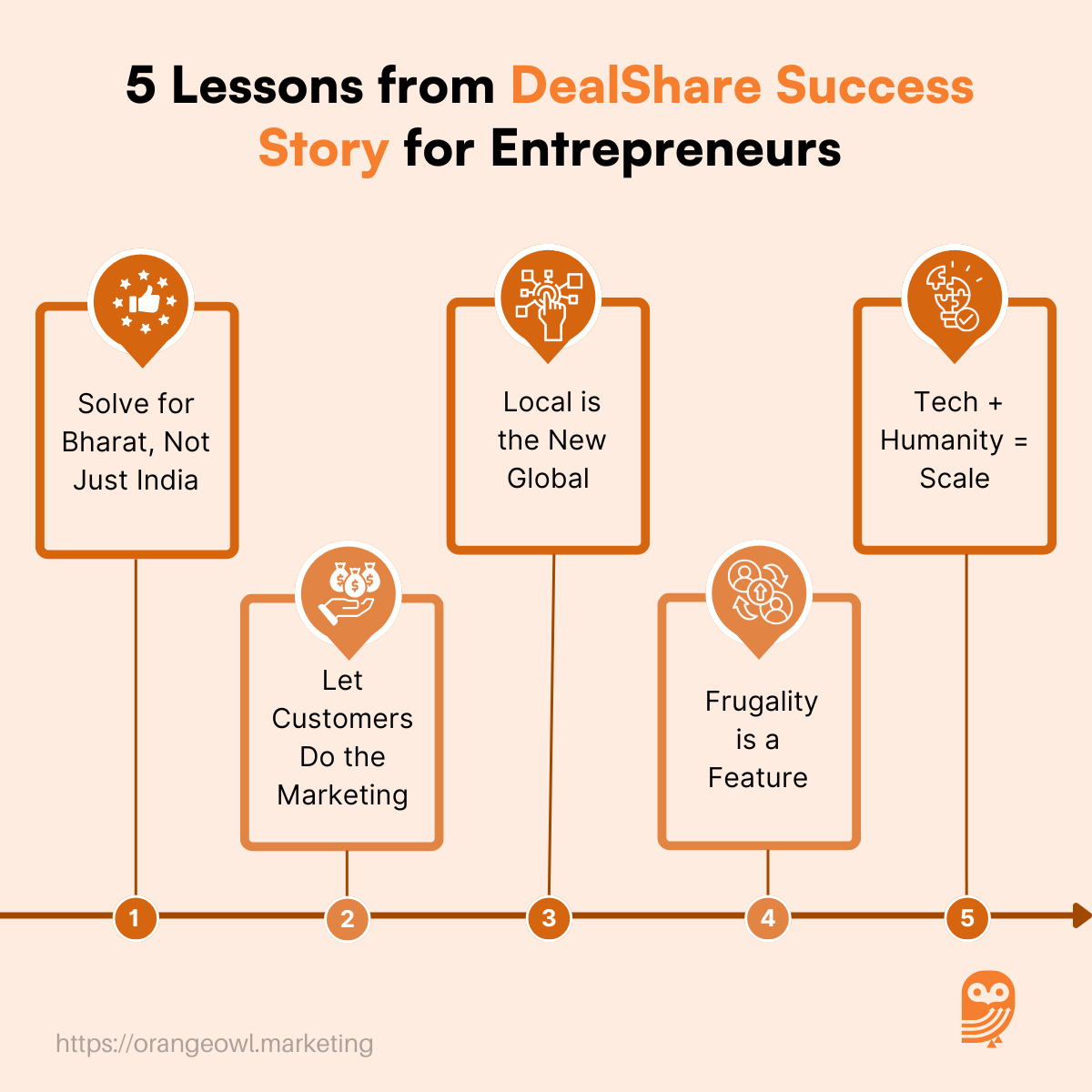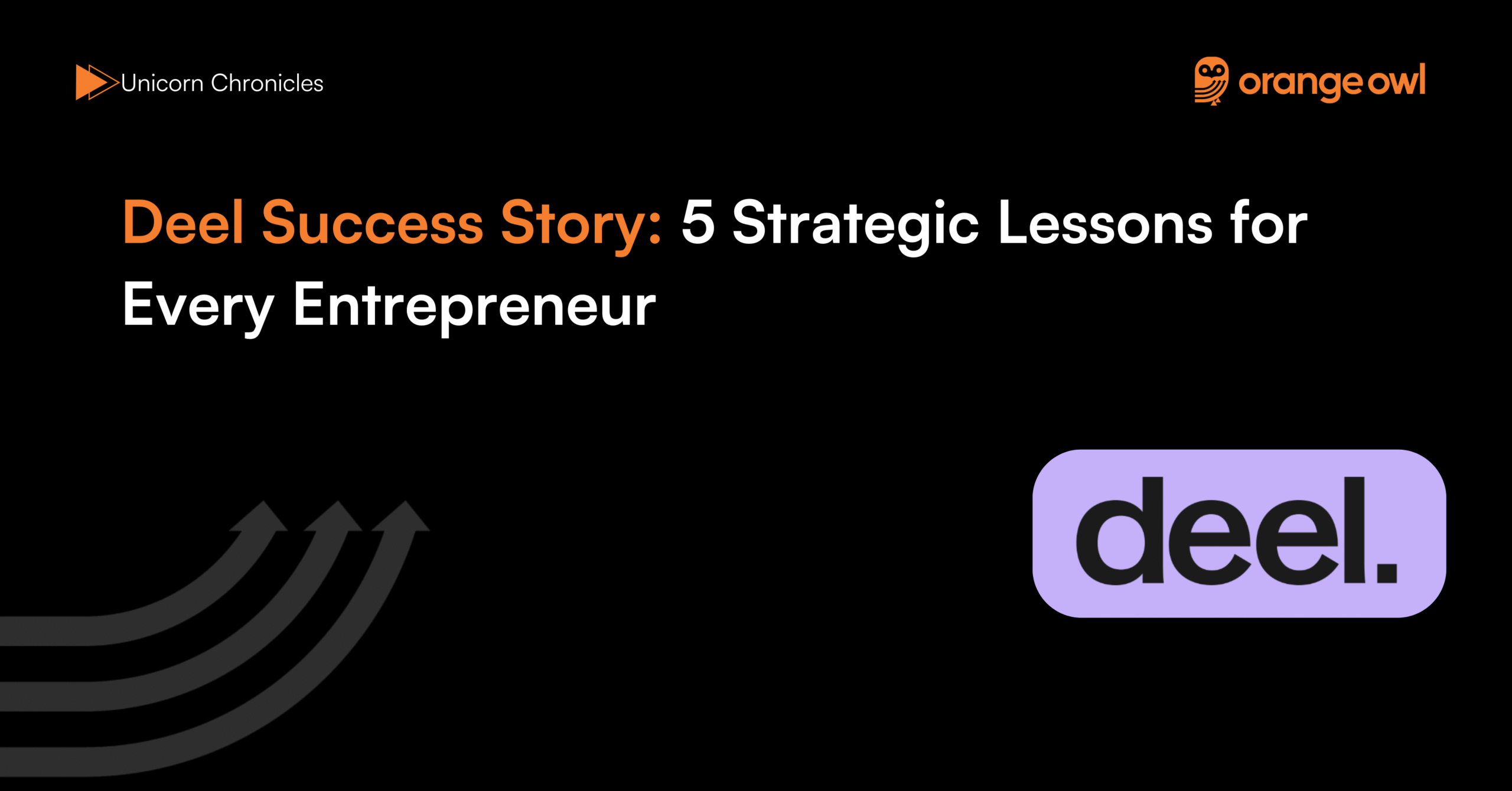DealShare Success Story: 5 Game-Changing Lessons for Every Entrepreneur
Vivek Goel
May 19, 2025

Table of Contents
Introduction
In 2018, as India’s e-commerce landscape predominantly catered to affluent urban consumers, DealShare identified a significant gap: the underrepresented and price-sensitive middle- and lower-income segments in Tier II and III cities. Recognizing this opportunity, DealShare was launched with a mission to democratize online shopping for “Bharat”—the broader Indian population beyond metropolitan areas.
Founded by Vineet Rao, Sourjyendu Medda, Sankar Bora, and Rajat Shikhar, DealShare crafted a unique model inspired by the shopping behaviors of these regions, emphasizing affordability, localization, and social commerce. This approach resonated deeply with consumers, leading to rapid adoption and growth.
By early 2022, DealShare had achieved a valuation of $1.7 billion, following a $210 million Series E funding round. This round saw participation from prominent investors, including Tiger Global, Alpha Wave Global, Dragoneer Investments Group, Kora Capital, Unilever Ventures, and the Abu Dhabi Investment Authority (ADIA)
The company’s innovative community-led virality model significantly reduced fulfillment costs to 5–6% of the order cost, compared to the typical 20% in traditional e-commerce setups . This efficiency, combined with a focus on regional products and vernacular interfaces, enabled DealShare to scale rapidly across multiple states, including Rajasthan, Gujarat, NCR, Maharashtra, and Karnataka .
Reflecting on their journey, CEO Vineet Rao remarked:
“India has two consumer economies—urban India and rural Bharat. Most platforms only solved for the first. We chose to go deeper into Bharat.”
This strategic focus on Bharat not only differentiated DealShare from other e-commerce players but also established it as a blueprint for building meaningful, scalable ventures in emerging markets.
Origin Story
The genesis of DealShare lies in an unconventional yet deeply insightful experiment that started on WhatsApp. In mid-2018, Vineet Rao, along with co-founders Sourjyendu Medda, Sankar Bora, and Rajat Shikhar, set out to validate a hunch: Could the power of social sharing and group buying translate into real commerce in smaller Indian towns?
They began by circulating curated grocery deals through WhatsApp groups in Jaipur, targeting price-sensitive households. The response was immediate and overwhelming. Within weeks, orders poured in, feedback loops formed organically, and most importantly, word-of-mouth drove exponential growth without any paid marketing. This early traction was not just proof of concept—it was proof of demand.
This pilot laid the foundation for the launch of the full-fledged DealShare platform in September 2018. But the co-founders were never aiming to merely build another e-commerce site. Their ambition was to mirror the social experience of shopping in a traditional Indian “haat” or local bazaar—an experience filled with conversation, comparison, and community interaction.
“Our idea was to recreate the excitement of neighborhood shopping in a digital format,” said Vineet Rao, CEO of DealShare
This vision meant prioritizing regional languages, curating local brands, and offering group discounts that could be shared among friends and family. What set DealShare apart from the beginning was its refusal to conform to the standard e-commerce playbook. Instead, it embraced the social commerce model—where discovery happens via friends, family, and community—and married it with a deep understanding of Bharat’s shopping psyche.
By focusing on needs over wants, and essentials over indulgence, DealShare resonated with a market often ignored by India’s major online retailers. The journey that began in a few WhatsApp groups in Jaipur has since evolved into a full-scale digital retail revolution across 150+ cities in 10 Indian states, serving over 20 million consumers.
Business Landscape and Challenges
India’s e-commerce sector is among the most dynamic and cutthroat in the world, dominated by global giants like Amazon, homegrown juggernauts like Flipkart, and deep-pocketed new entrants such as JioMart. These companies had already claimed significant consumer mindshare, especially in urban metros, by the time DealShare entered the scene.
But instead of engaging in a pricing or delivery war with these incumbents, DealShare took a radically different route—one that many had overlooked. The company chose to focus on middle- and lower-income consumers in Tier II, III, and IV towns, often referred to as the “Bharat” market. This bold move helped the company sidestep direct competition and instead create a new category of value-driven, community-led commerce.
However, this path came with its own complex set of challenges:
1. Low Digital Fluency
Unlike urban consumers who were accustomed to seamless app experiences and online transactions, many of DealShare’s target users were first-time internet shoppers. Navigating a mobile app, selecting products, and making digital payments were entirely new behaviors for them.
“We had to reimagine the entire app experience in a way that even our parents could use it,” said Vineet Rao, CEO of DealShare.
This meant designing a simplified, vernacular, and intuitive interface that minimized friction. The team introduced features like voice search, regional language options, and COD (Cash on Delivery) to ease users into the online shopping journey.
2. Last-Mile Delivery Hurdles
Reaching the end consumer in smaller towns and rural areas posed another major hurdle. Unlike Amazon and Flipkart, DealShare didn’t have a massive pre-built logistics backbone. To solve this, they built their own hyperlocal supply chain, often partnering with local logistics players and even deploying temporary warehouses in high-demand zones.
The challenge wasn’t just about delivery—it was about doing it profitably, often with order values as low as ₹300–₹500. DealShare tackled this by clustering deliveries, optimizing vehicle routes, and introducing community buying to increase order density.
3. Skepticism Around New Brands
One of DealShare’s core strategies was to promote local and lesser-known brands, offering them a platform to reach mass audiences. While this helped keep prices low, it also created trust issues among consumers, many of whom were unfamiliar with these products.
The team tackled this by heavily curating their product catalog, offering easy returns, and investing in social proof mechanisms, like user reviews and community ratings. In addition, many purchases were driven through referrals and group buying, allowing trust to flow socially.
“If we could solve these frictions, we would unlock a huge market that no one was serving,” Vineet shared in a candid discussion on their early challenges.
Growth Strategies
DealShare’s phenomenal rise in India’s value-conscious market wasn’t simply a result of offering discounts—it was driven by deliberate, deeply embedded strategies that aligned with the behaviors and preferences of its target audience. One of the core pillars of their growth was hyperlocal sourcing.
Nearly 70–80% of DealShare’s inventory came from regional and local brands, eliminating middlemen and enabling better margins.
As Sourjyendu Medda, Co-founder and Chief Commercial Officer, explained, “Local brands often offer better margins and are more trusted in their specific regions.”
This allowed the platform to offer affordable prices while supporting regional economies.Another defining move was the adoption of the group buying model, inspired by China’s Pinduoduo. This allowed users to share deals with friends and earn discounts when shopping together. The model wasn’t just a price gimmick—it became a powerful tool for customer acquisition, repeat purchases, and organic virality, especially on platforms like WhatsApp where community interactions are strong.
Instead of scaling across the country all at once, DealShare executed regional rollouts, consolidating dominance in one state or city before expanding to the next. This city-by-city approach helped them understand local needs, tweak supply chains accordingly, and build a loyal user base.
Behind the scenes, the company invested heavily in tech-enabled efficiency. DealShare developed proprietary tools for inventory forecasting, micro-fulfilment logistics, and personalized deal recommendations, allowing them to operate at scale while controlling costs. Even as the company scaled rapidly, its founders emphasized frugality. “We were always paranoid about cash. We grew with discipline, not just investor money,” said Vineet Rao, CEO of DealShare. This mindset ensured capital efficiency and sustainable growth, making the business more resilient in a competitive environment.
Marketing Strategy
While most e-commerce startups pour capital into influencer campaigns, celebrity endorsements, and high-budget ads, DealShare took a completely different route—grassroots marketing that resonated with its audience. The company’s early growth was driven heavily through WhatsApp-led sales, where users shared daily deals and invited friends to participate in group purchases.
This peer-driven distribution created a viral loop that required minimal marketing spend. In addition, referral and cashback programs gamified the process, turning every customer into a potential ambassador for the brand. These incentives not only fueled new user growth but also improved retention.
Another masterstroke was DealShare’s vernacular-first approach. Recognizing that trust is often built through language, the platform offered content and support in languages like Hindi, Gujarati, Marathi, and Kannada.
As Vineet Rao put it, “Language is not just a medium—it’s trust. If you speak to people in their language, they engage more deeply.”
This strategic localization allowed DealShare to connect authentically with users in every region. The platform also tapped into local festivals and cultural moments, creating targeted offers during events like Onam, Diwali, and Holi, thereby boosting conversions and emotional engagement.
Perhaps the most community-driven aspect of DealShare’s strategy was its ambassador network. The company activated local women entrepreneurs and community leaders, positioning them as DealShare Evangelists. These micro-influencers—trusted voices in their neighborhoods—helped onboard users, build brand credibility, and drive repeat orders.
This grassroots model created a sense of ownership and belonging among users, something that traditional advertising simply couldn’t achieve. Together, these unconventional yet powerful strategies turned DealShare into a word-of-mouth-driven e-commerce powerhouse, deeply entrenched in India’s heartland.
5 Game-Changing Lessons for Every Entrepreneur
1. Solve for Bharat, Not Just India
One of the most defining principles behind DealShare’s success was its unwavering focus on Bharat—the real India that lies beyond the metros.
As co-founder Vineet Rao emphasized, “If your idea works for the top 50 million, ask yourself—can it work for the next 500 million?”
While most startups gravitated toward tech-savvy urban users, DealShare saw untapped potential in Tier 2, 3, and 4 towns where consumers were hungry for value, convenience, and trust. By tailoring every aspect of the business—from app design to delivery networks—to the needs of these regions, DealShare proved that India’s biggest consumer opportunities lie outside big cities. This approach is a wake-up call for entrepreneurs: mass adoption doesn’t begin in metros—it begins in the margins.
2. Let Customers Do the Marketing
Instead of burning investor money on ads, DealShare engineered virality into the product itself. Their group buying model wasn’t just about savings—it was about enabling customers to share deals with their social circles. Every user became a channel of organic marketing, turning friends and families into shoppers.
This built-in social mechanism not only kept user acquisition costs low but also accelerated brand trust. As the company demonstrated, when users are incentivized to invite others—and have a great experience while doing it—they become the most credible marketers. For startups, the lesson is clear: products that are designed to be shared spread faster than any campaign ever could.
3. Local is the New Global
By prioritizing local brands, regional dialects, and culturally relevant experiences, DealShare crafted a shopping environment that resonated deeply with its users. Instead of merely translating content, they transformed the user journey for each new geography—adjusting product assortments, offers, language, and even delivery expectations to match local sensibilities.
As Vineet noted, “We didn’t just translate—we transformed the user journey for every region we entered.”
This localization built instant familiarity and trust, creating a stickiness that global platforms often failed to achieve. For entrepreneurs, the takeaway is simple: embracing local cultures and businesses is not just ethical—it’s strategic.

4. Frugality is a Feature
Even during phases of rapid growth, DealShare remained unapologetically lean. They avoided unnecessary frills, optimized their logistics, and stayed grounded in the economics of each sale. This frugal mindset ensured positive unit economics and long-term sustainability, rather than dependence on perpetual fundraising.
“Growth is important. But sustainable growth is everything,” Vineet often reiterated. At a time when startups are judged by burn rate instead of profitability, DealShare’s approach proves that lean operations and discipline are not constraints—they are competitive advantages.
5. Tech + Humanity = Scale
While DealShare invested heavily in technology—building tools for inventory, personalization, and logistics—they never forgot the human side of commerce. Their vernacular-first interfaces, community ambassador programs, and local festivals-based campaigns reflected deep empathy for the user.
By blending automation with a human touch, the brand created a sense of belonging that technology alone can’t replicate. This balance of scale and sensitivity allowed DealShare to grow rapidly without alienating the very communities they aimed to serve. For entrepreneurs, it’s a reminder that the best tech solutions are those that still feel human.
Conclusion: Key Takeaways from DealShare’s Journey
DealShare didn’t win the market by being the flashiest, fastest, or most-funded startup. It won by being the most relevant—by deeply understanding what its audience valued and delivering exactly that, consistently and empathetically. While other platforms raced to slash prices and expedite deliveries, DealShare focused on community-driven commerce that felt more like a neighborhood bazaar than a digital storefront. This grassroots strategy created a sense of ownership among users, turning customers into advocates and transactions into relationships.
Their journey offers a compelling playbook for modern entrepreneurs: go hyperlocal before going national, build trust before chasing scale, and grow with frugality, not vanity. DealShare stands as a powerful case study in how contextual innovation—tailored to India’s diverse and complex consumer landscape—can outpace even the largest of players. As Vineet Rao wisely said, “India doesn’t need another unicorn. It needs startups that truly understand its people.” DealShare didn’t just understand India—it embraced Bharat. And in doing so, it created not just a successful company, but a movement in inclusive commerce.


